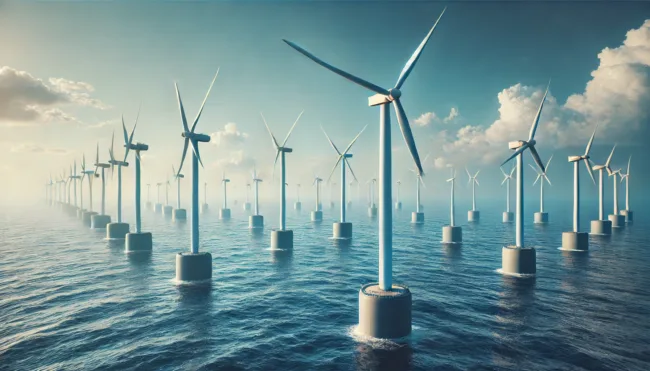Interior Department grants first floating offshore wind research lease to Maine, sparking new wave of clean energy
In a landmark decision that could reshape the future of renewable energy in the United States, the U.S. Department of the Interior has issued the nation’s first floating offshore wind energy research lease to the State of Maine. This move represents a significant milestone in the Biden-Harris administration’s drive to accelerate the transition to a clean energy economy, with the potential to generate up to 144 megawatts of renewable energy. The lease covers nearly 15,000 acres located 28 nautical miles offshore on the U.S. Outer Continental Shelf and could see the deployment of 12 floating offshore wind turbines.
Maine’s Offshore Wind Project: A Game Changer for Clean Energy
This initiative is expected to not only contribute to the administration’s ambitious goal of deploying 30 gigawatts of offshore energy by 2030 but also to create numerous well-paying jobs in local communities. The project will be a vital component of the U.S.’s broader strategy to combat climate change and promote sustainable economic growth.
Secretary of the Interior Deb Haaland highlighted the significance of this development, stating, “Our clean energy future is now a reality – I am so proud of the progress being made by the Bureau of Ocean Energy Management as we work to address climate change, foster job growth, and promote equitable economic opportunities for all communities.”

U.S. Department of the Interior has issued the nation’s first floating offshore wind energy research lease to the State of Maine.
Floating Wind Technology: Revolutionizing Renewable Energy
Floating wind technology is a groundbreaking advancement that allows wind turbines to be installed in deeper waters, far offshore where wind speeds are higher and more consistent. This technology is crucial for states like Maine, where coastal waters are deep, making traditional fixed-bottom wind turbines less feasible. The Gulf of Maine, known for its challenging marine environment, offers a unique opportunity to test and refine this technology, potentially setting a global standard for floating wind energy.
Elizabeth Klein, Director of the Bureau of Ocean Energy Management (BOEM), emphasized the importance of this project, stating, “Signing the Gulf of Maine research lease demonstrates the commitment by both BOEM and the State of Maine to promote a clean energy future for the nation. It is another example of a successful all-of-government effort to reach the Administration’s offshore wind energy goals and to combat the impacts of climate change.”
Biden-Harris Administration’s Commitment to Clean Energy
The issuance of this lease is part of President Biden’s broader “Investing in America” agenda, which focuses on rebuilding the nation’s infrastructure, driving significant private sector investments in clean energy, and creating sustainable jobs. The administration has already made substantial progress, with the Department of the Interior approving the first nine commercial-scale offshore wind projects, amounting to over 13 gigawatts of clean energy – enough to power nearly 5 million homes.
Moreover, BOEM has conducted five offshore wind lease auctions, including the first-ever sales offshore the Pacific Coast and in the Gulf of Mexico. These efforts are expected to lay the foundation for a thriving offshore wind industry in the U.S., with plans for up to 12 additional lease sales through 2028.
Research and Development: Paving the Way for Commercial Offshore Wind
The research lease granted to Maine will enable the state, in collaboration with the fishing community, wildlife experts, and other stakeholders, to conduct comprehensive studies on the environmental and engineering aspects of floating offshore wind technology. This research is critical for informing future commercial-scale projects, ensuring that they are developed in a manner that protects both local ecosystems and national interests.
Pine Tree Offshore Wind, LLC, has been designated as the operator for this research lease (OCS-A 0553). The research conducted under this lease will provide valuable insights that will shape the future of offshore wind energy in the U.S. However, construction activity on the research array is not expected to begin for several years, as the lessee must first submit a Research Activities Plan, which will undergo rigorous environmental analysis under the National Environmental Policy Act.
The Global Impact of U.S. Offshore Wind Initiatives
The successful implementation of this project could have far-reaching implications beyond U.S. shores. As countries around the world look to reduce their carbon footprints and transition to renewable energy sources, the advancements made through this lease could position the U.S. as a leader in floating wind technology. This could open up new markets for American companies and spur innovation in the renewable energy sector.
In conclusion, the execution of the nation’s first floating offshore wind research lease is not just a milestone for Maine but a significant step forward in the global push for clean energy. As the U.S. continues to lead in this field, the lessons learned from Maine’s offshore wind project could serve as a blueprint for similar initiatives worldwide.
Discover more from Business-News-Today.com
Subscribe to get the latest posts sent to your email.

